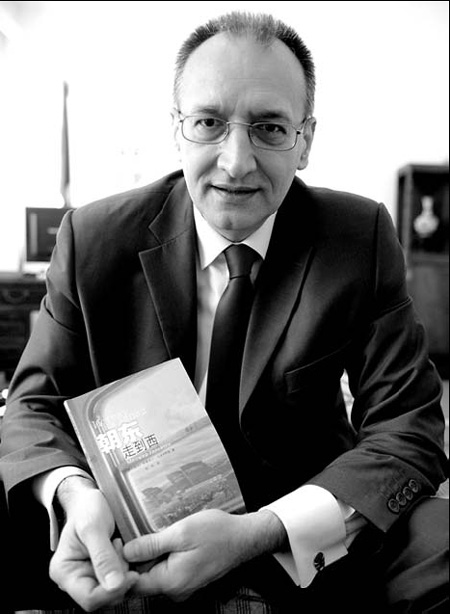Ringside view
|
Miomir Udovicki, Serbian ambassador to China, has been witnessing the great changes of China over the past 30 years. photos by du lianyi/China Daily |

Since arriving as a young student in the early 1980s to working as his homeland's ambassador today, Serbia's top diplomat has seen this nation's dramatic transformation at close quarters and chronicled them in his book. Guo Shuhan reports
Ask Miomir Udovicki, Serbian ambassador to China, to name the one thing that comes to mind about Beijing in the early 1980s and he will say, bai cai, or Chinese cabbage. Those were times when the long winters meant no fresh vegetables and Beijingers would buy and store piles of cabbage to see them through the freezing days.
In Going East toward the West (Chaodong Zoudaoxi), whose Chinese translation was recently released, Udovicki, 56, paints a vivid picture of the country in the early days of reform and opening-up.
The ambassador also has clear recollections of the blackened faces of women carrying basket-loads of coal on their heads, during his travels in China about three decades ago.
These images are representative of the characteristics that helped the nation survive those difficult times, he says.
Udovicki traces his early fascination with Chinese culture to an uncle who taught Chinese at the People's University of Belgrade in the 1970s. He also founded the university's Faculty for Chinese Language and Literature in the 1980s.
The world literature major from Belgrade University landed in Beijing in 1981 to pursue his master's in language and literature from the Beijing Language and Culture University as part of an exchange program.
Going East toward the West, first published in 1995 in Serbian, shows the dramatic changes that have occurred in Chinese people's lives as witnessed by two foreign students, who travel from Beijing to Chengdu in search of "the meaning of life".
"The social development that we see in China now was unimaginable in the 1960s and 1970s. It has grown into one of the leading world powers according to many parameters and yet preserved its social and economic stability," Udovicki says. "That's a tremendous effort and success, especially keeping in mind that China has a population of more than 1.3 billion."
Udovicki returned to Beijing in 1985 as second secretary in the embassy of Yugoslavia and served in that capacity for four years. In 2006, he was appointed ambassador of Serbia to China. His primary goal is to develop further relations between Serbia and China, and establish a strategic partnership.
At the Shanghai Expo, the Serbian Pavilion has been impressing visitors with an innovative design inspired by traditional Serbian carpets. In keeping with the Expo's theme of "Better City, better Life", the pavilion is organized around the following eight aspects of urban life - history, culture, economy, citizenship, urban ecosystem, renewable energy, city style and communication.
More Chinese are expected to visit Serbia with the inking of the Agreement on Cooperation in Tourism, during President Boris Tadic's visit to China last August.
"What would certainly be interesting to Chinese tourists are our many spas, which can cure all sorts of health problems, trips on the Danube, winter tourism, numerous historical monuments and cultural heritage sites, as well as festivals of modern and traditional music," Udovicki says.
Beside his busy schedule, the diplomat retains his love of Chinese literature, his favorite authors being the literary giants Lu Xun (1881-1936) and Ba Jin (1904-2005).
Udovicki caused a sensation in his motherland when he introduced Lao She's masterpiece Teahouse 20 years ago. He admires the Chinese writer's deep insight into people caught in the throes of social upheavals. The translated work became the talk of the town, inspiring keen interest in Chinese history and culture.
Of today's writers, the ambassador mentions Guo Xiaolu and Han Han.
"Despite language barriers, people from different civilizations can understand one another," says Udovicki, who is also a fan of master painter Qi Baishi (1864-1957).
|
Miomir Udovicki with his translated Chinese version of Going East toward the West. |
(China Daily 05/29/2010 page11)
















